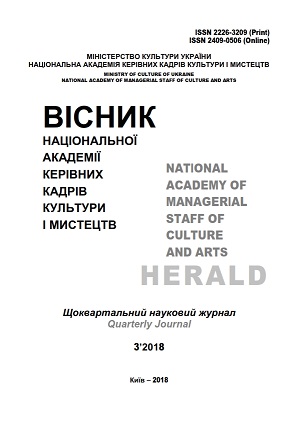Культура управління Стародавньої Греції
Culture of Ancient Greece Management
Author(s): Elena Yaroslavivna KovalenkoSubject(s): Cultural history, Governance, Political history, Ancient World, Politics and society, Management and complex organizations, Rural and urban sociology, Sociology of Politics
Published by: Національна академія керівних кадрів культури і мистецтв
Keywords: Culture of Management; Ancient Greece; Society;
Summary/Abstract: Purpose of the article is theoretical analysis and generalization of the peculiarities of the culture of the management of Ancient Greece, which will contribute to the enrichment of cultural science with new knowledge about the formation and development of a culture of management at the stage of the birth of European civilization. Methodology. The methodological basis of the study is the dialectical principle of cognition, systemic, civilization, sociocultural, activity, historical approaches, fundamental provisions of the theory and history of society, its culture and management. General scientific and interdisciplinary research methods are used: analysis and synthesis, induction and deduction, comparison, generalization, formalization. Scientific novelty of the obtained results is the discovery and systematic generalization of the features of the management culture in Ancient Greece. Conclusions. Entirely new and most significant achievement of ancient Greek management culture is the invention of a democratic system of governance, in which: first, the single state authorities are replaced by collective; secondly, members of joint management bodies are relatively equal in law; and thirdly, decisions are made by the will of the majority; fourthly, public authorities are elected; fifth, the independence of power control; sixth, desacralization of power; Seventh, the division of power into executive, legislative, judicial and authority. The first form of democratic governance was the aristocratic democracy, which included the power of the tribal nobility, which, on a democratic basis, formed the highest collective bodies of state power and governance. With the aggravation of the struggle between the aristocracy and the free population and the implementation of a series of reforms, the following forms of democratic organization and governance emerged: politics – the power and management of wealthy citizens, and popular democracy – the power of all free citizens. It was proved that the most balanced was political, and the expansion of freedom led to the redistribution of property, conflicts, wars, and the weakening of the state. Ancient contribution to the development of the theory, methodology and culture of management was made by ancient Greek philosophers Socrates, Xenophon, Plato, and Aristotle, forming some prerequisites for modern scientific management.
Journal: Вісник Національної академії керівних кадрів культури і мистецтв
- Issue Year: 2018
- Issue No: 3
- Page Range: 138-143
- Page Count: 6
- Language: Ukrainian

